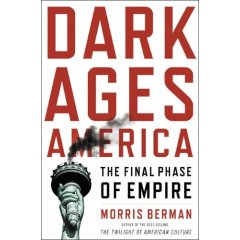Berman's "Dark Ages America"
 I posted this review of DARK AGES AMERICA: THE FINAL PHASE OF EMPIRE by Morris Berman yesterday on Amazon.
I posted this review of DARK AGES AMERICA: THE FINAL PHASE OF EMPIRE by Morris Berman yesterday on Amazon. I also recommend you listen to Berman interviewed by Lenny Lopate on wnyc.org last week -- it's sure to pique your interest.
DARK DESTINY, posted on Amazon, April 27, 2006
A work of breathtaking erudition and synthesis, DARK AGES AMERICA offers no hope for arresting America's career as a self-destructive global hegemon. While that's a difficult conclusion to swallow, Berman amply defends his thesis, drawing his supporting evidence from a variety of disciplines: history, cultural studies, polling data, economic analysis, sociology and social psychology. The possibility of America's turning away from its dark destiny, which in Mr. Berman's analysis is now clearly manifest, is made to seem remote, and, regrettably, convincingly so.
Particularly compelling is Mr. Berman's discussion of America's need for an enemy, an Other upon which to focus in order that we never turn our attention to the emptiness at the center of the American psyche: The Red Menace, the Cold War, the War on Drugs, The War on Terror. Each of these wars has served to diminish and even outlaw critical thinking about America's empiric career. In a constant state of emergency, history for Americans is a set of bullet points which are cynically served up as justification for the latest military adventure. Berman's anecdotes and survey findings paint an American populace that is self-absorbed, provincial, and willfully anti-intellectual, a people for whom bullet points more than suffice.
We watch television shows about tightly knit families and groups of friends, staving off the loneliness generated by the individualistic, devil-take-the-hindmost ethos that is America's real civil religion, Berman says. We turn away from the terror that we inflict on innocent people in order that we may claim their oil wealth and so keep this dwindling life-blood flowing in the veins of the American project of global empire. We pay no attention to the vast sums of money spent to prop up the energy-military-industrial complex. Instead we are distracted by cynical stories of welfare queens, wicked tax and spend liberals, evil dictators and axes of evil, our resentments kept well-stoked and smoldering.
On a personal note, landing at Kansas City International Airport the other day, my vision of America altered by my in-flight reading of Mr. Berman's remarkable work, I saw the landscape through new eyes, a landscape I now understood to have been systematically vandalized by the corporatocracy: big box stores, chain hotels and restaurants, strip malls and gas stations, a landscape everywhere repeated across the United States, a landscape we intend to impose upon the world in order to fulfill our destiny as bringer of freedom as expressed through consumption.
While this cookie-cutter landscape had always before aroused in me a sense of unease, an unease that had become in me clich? and so easily subdued, with the assistance of Berman's perspicacious vision, I became alive to the fact that this American landscape represents in physical form the ingenuity and monomania of America's new empiric form.
Empty of community, driven by the ethos of radical individualism, I saw an interlocking system of endless consumption in which we are all driven by the relentless stoking of our vanity and desire by clever marketers who have taught us to confuse social goods with economic goods, and by a political structure which mystifies cause and effect, which ruthlessly condemns anyone who has the temerity to question the course of this bleak, empty empire.


2 Comments:
Shazam! It's amazing you haven't slit your wrists in the bathtub yet.
Shazam! It's amazing you haven't slit your wrists in the bathtub yet.
This is a typical response of an arrogant mainstream denizen of the United States of America who believes that he/she is entitled to make a boorish comment about a review of a book that he/she has not and will not be bothered to read. The comment is another example that supports the thesis that Morris Berman lays out in this book.
Post a Comment
<< Home